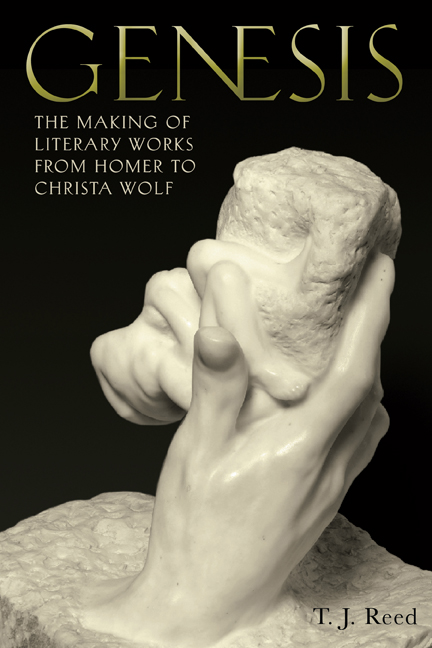Book contents
- Frontmatter
- Dedication
- Contents
- Note on Quotations and Translations
- Preface
- Introduction: Processes
- Part I Antiquity
- 1 Homer's Audiences: Shaping the Iliad (and the Odyssey)
- 2 Fourfold Genesis: The Bible between Literature and Authority
- Part II Early Modern
- 3 An Alphabet of Experience: Montaigne
- 4 Beginner's Luck: Shakespeare's History Cycles
- Transition—Tradition
- Part III Goethe
- 5 Cross-Purposes: Goethe's Faust
- 6 Occasions: Goethe's Lyric Poetry
- 7 Live and Learn: Werther and Wilhelm Meister
- Part IV Nineteenth- and Twentieth-Century German
- 8 Writing on the Run: Georg Büchner's Revolutions
- 9 “The Best-Laid Schemes…”: Thomas Mann Unplanned
- 10 Description of a Struggle: Kafka's Half-Escape
- 11 Atomic Beginnings: Brecht, Galileo, and After
- 12 Knowing and Partly Knowing: Paul Celan's Mission
- 13 Christa Wolf: A Fall from Grace
- Afterword
- Notes
- Bibliography
- Index
9 - “The Best-Laid Schemes…”: Thomas Mann Unplanned
Published online by Cambridge University Press: 16 September 2020
- Frontmatter
- Dedication
- Contents
- Note on Quotations and Translations
- Preface
- Introduction: Processes
- Part I Antiquity
- 1 Homer's Audiences: Shaping the Iliad (and the Odyssey)
- 2 Fourfold Genesis: The Bible between Literature and Authority
- Part II Early Modern
- 3 An Alphabet of Experience: Montaigne
- 4 Beginner's Luck: Shakespeare's History Cycles
- Transition—Tradition
- Part III Goethe
- 5 Cross-Purposes: Goethe's Faust
- 6 Occasions: Goethe's Lyric Poetry
- 7 Live and Learn: Werther and Wilhelm Meister
- Part IV Nineteenth- and Twentieth-Century German
- 8 Writing on the Run: Georg Büchner's Revolutions
- 9 “The Best-Laid Schemes…”: Thomas Mann Unplanned
- 10 Description of a Struggle: Kafka's Half-Escape
- 11 Atomic Beginnings: Brecht, Galileo, and After
- 12 Knowing and Partly Knowing: Paul Celan's Mission
- 13 Christa Wolf: A Fall from Grace
- Afterword
- Notes
- Bibliography
- Index
Summary
Out of Himself
IN A SUBLIME PUT-DOWN, Bertolt Brecht once said of Thomas Mann, author of some of the most monumental and highly regarded novels of the twentieth century, “I always found his short stories really quite good.” In his beginnings Mann did indeed think of himself as no more than a short-story writer with no higher formal ambitions. A favorite author and model was Maupassant. Mann's first major work had to be drawn out of him by circumstances to which his talent responded with amazing sophistication (he was still in his early twenties). The pattern repeated itself. Throughout his career ever larger undertakings grew out of initial small-scale plans. In contrast, a phase of career-conscious grand designs through which he hoped to confirm his early success proved arid—the desired masterpieces couldn't be written to order. Fortunately, these grand projects became superfluous when an unforeseen impulse took over.
In 1897 the young Thomas Mann succeeded in placing a piece with Samuel Fischer's Neue Rundschau. Fischer, then the publisher of the avant-garde, was impressed enough to reprint it as the title story for a volume with five other already published stories of Mann’s. Little Herr Friedemann appeared in the “Collection Fischer,” gratifyingly alongside some then-esteemed names—Herman Bang, Hermann Bahr, Peter Altenberg. It was well received, was even compared with Chekhov's beginnings. It was no best-seller—by 1900 there were still 1597 copies left from a printrun of 2000. Still, Fischer kept faith with his beginner. He had already invited him to write a novel, “even if it's not so long.” That was intended not so much to set a limit as to encourage Mann to go beyond his present range. A longer work could incidentally pay higher royalties.
It was an offer a beginner couldn't refuse, but it posed problems besides just length. Mann's early stories were grotesque and pathological cases of human oddity, of suffering and social exclusion, all narrated with a cool detachment that suggested (was surely meant to suggest) a maturity beyond the young author's experience. It had sources in the ironists who had shaped Mann's outlook—Heine and, especially, Nietzsche.
- Type
- Chapter
- Information
- GenesisThe Making of Literary Works from Homer to Christa Wolf, pp. 174 - 190Publisher: Boydell & BrewerPrint publication year: 2020



